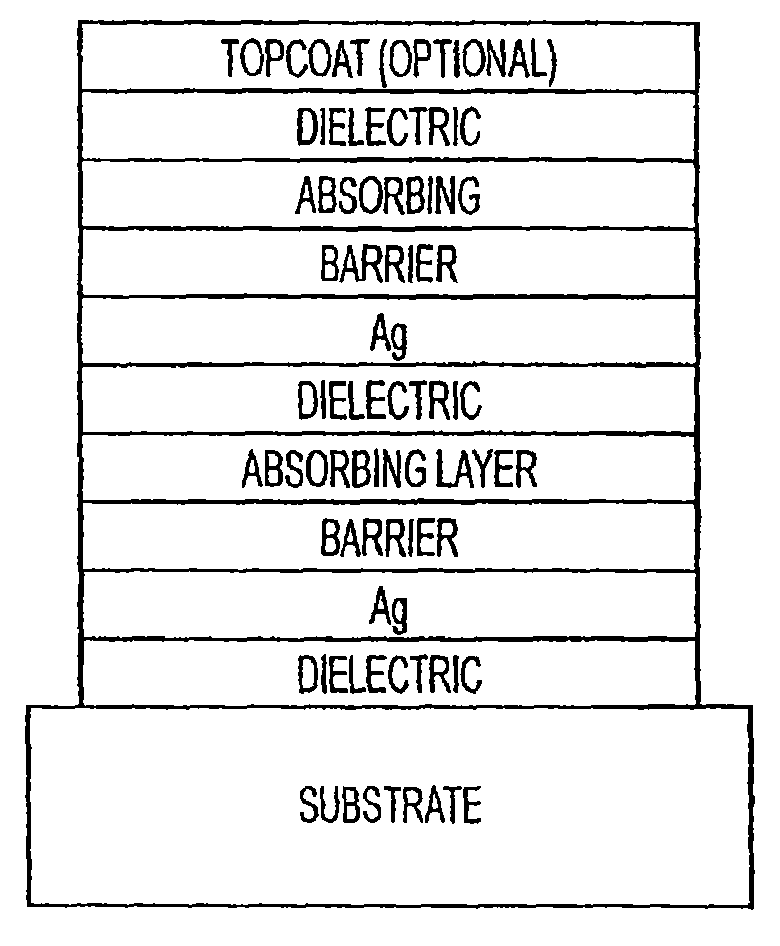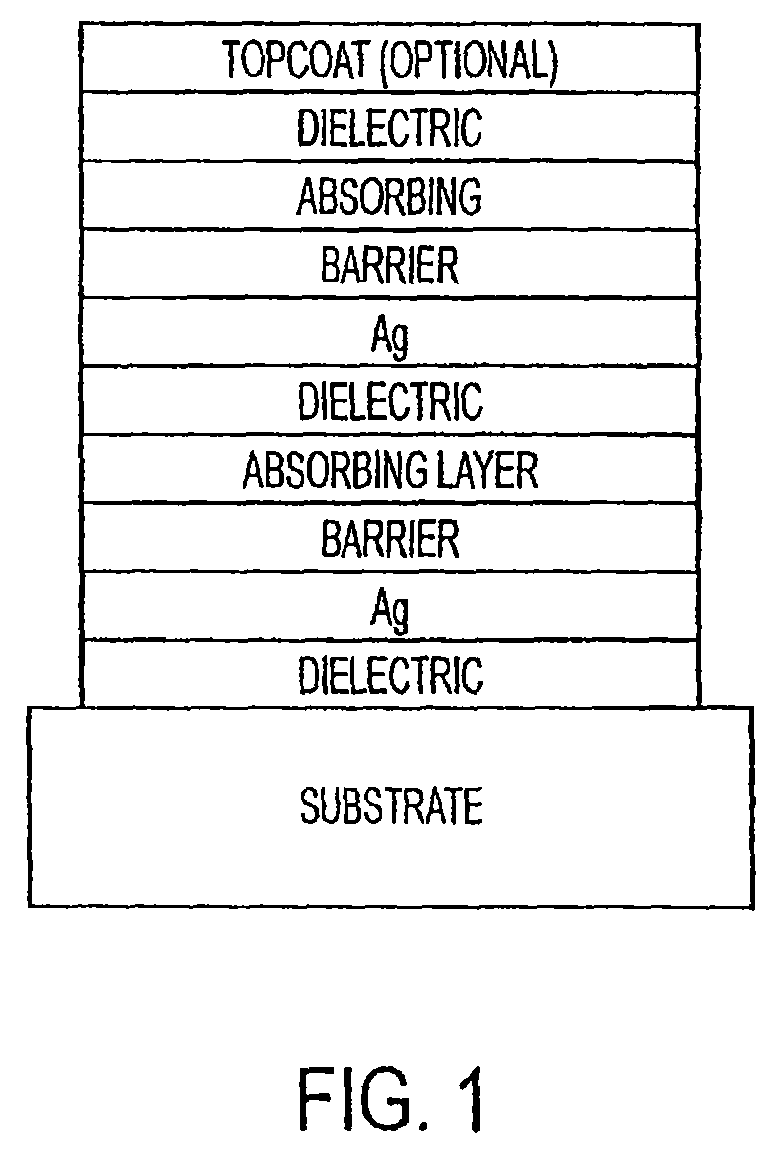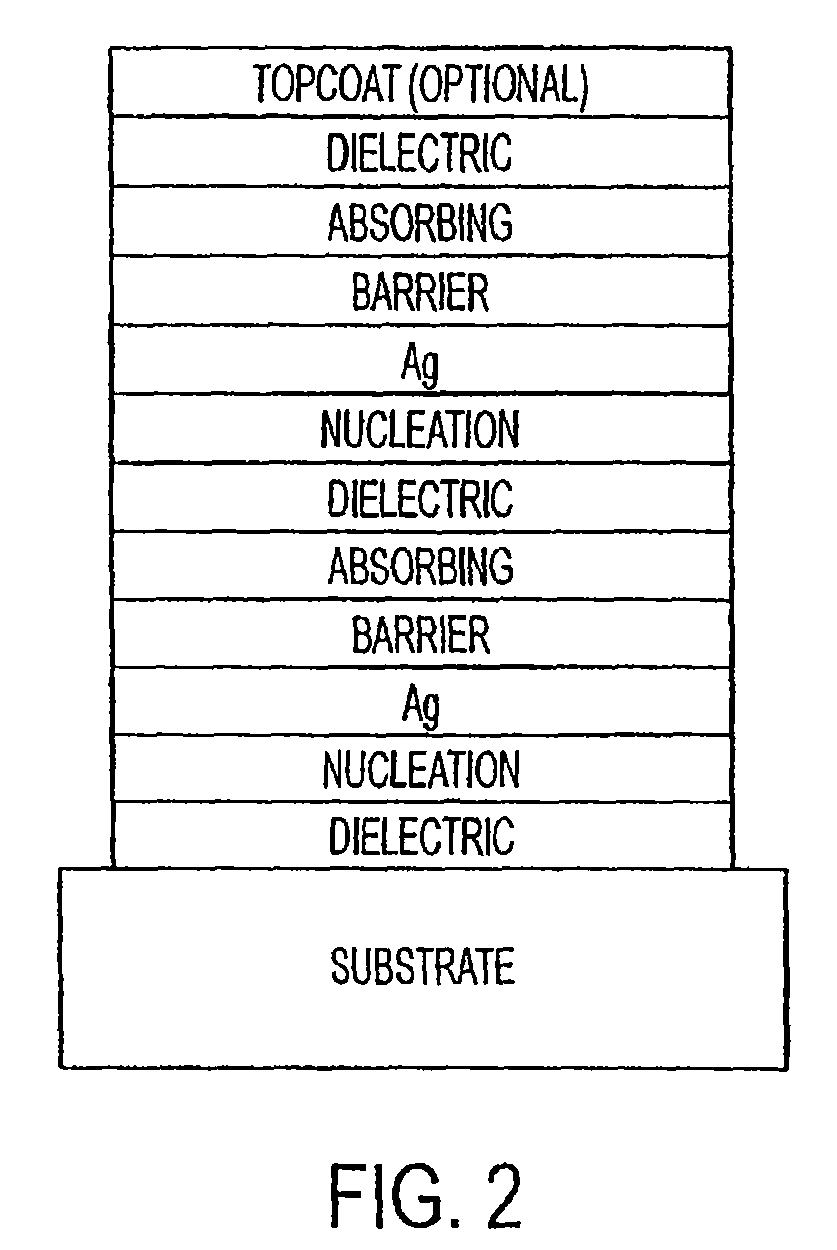Low emissivity coating with low solar heat gain coefficient, enhanced chemical and mechanical properties and method of making the same
a low emissivity, coating technology, applied in the direction of natural mineral layered products, water-setting substance layered products, transportation and packaging, etc., can solve the problem of increasing light reflectance and other problems, and achieve the effect of low solar heat gain coefficient and equal or better chemical and mechanical durability
- Summary
- Abstract
- Description
- Claims
- Application Information
AI Technical Summary
Benefits of technology
Problems solved by technology
Method used
Image
Examples
example 1
[0119]In the present example, depicted in FIG. 4, a low-e coating is deposited on a glass substrate to form a stack having the following configuration: Glass / 12 nm oxide / 10 nm Ag / 2 nm NiCrOx / 4 nm NiCr / 72 nm oxide / 13 nm Ag / 2 nm NiCrOx / 3 nm NiCr / 23 nm oxide / 7 nm SiN. The oxide can be sputtered from a Ti, Zn, Sn, ZnSn alloy, or Bi target The oxide may comprise Nb2O5. The oxide may comprise up to about 20 wt %, preferably up to about 10 wt % of an element, such as Al or B, or similar such element to make the coater target conductive. The SiN topcoat is optional. This exemplified coating has an appealing transmittance color with a* and b* negative. The SHGC is below 0.30. The coating has an acceptable mechanical and chemical durability.
example 2
[0120]In the present example, a low-e coating is deposited on a glass substrate to form a stack having the following configuration: about ⅛ inch Glass / 0-15 nm dielectric / 2-10 nm nucleation layer / 8-15 nmAg / 0.1-4 nm barrier / 0.2-8 nm Absorbing layer / 40-75 nm dielectric / 2-10 nm nucleation layer / 8-18 nmAg / 0.1-4 nm barrier / 0.2-8 nm Absorbing layer / 10-40 nm dielectric / topcoat. The dielectric can be an oxide (as in example 1) or a nitride or an oxy-nitride of Si, SiAl, SiB, SiZr and it may contain up to about 20 wt %, preferably up to about 10 wt % of an element, such as Al and B, to make the coater target conductive. The nucleation layer improves the properties of the Ag layer and is typically based on Zn oxide with up to 15 wt % of other elements such as Al, Sn or a combination thereof.
[0121]The barrier protects the Ag against the attack of the plasma when sputtering the dielectric atop. It also improves the chemical durability by controlling the diffusion of aggressive species such as O2...
example 3
[0123]In the present example, a low-e coating is deposited on a glass substrate to form a stack having the following configuration: about ⅛ inch Glass / 3-15 nm SiAlxNyOw / 3-10 nm ZnAlyOx / 8-12 nm Ag / 1-4 nm NiCrOx / 1.5-3.0 nm NiCr / 55-65 nm SiAlxNyOw / 3-10 nm ZnAlyOx / 10-15 nm Ag / 1-4 nm NiCrOx / 0.7-2.2 nm NiCr / 24-32 nm SiAlxNyOw / optional top coat. The top coat, if included, can be chosen from, but is not limited to 1-5 nm C, 1-10 nm of ZrO2, or ZrSiO2. The coating in the present example exhibits a light transmittance of about 42% to about 46%, as measured on an IGU, a SHGC below about 0.30, and the transmittance color is gray and can be adjusted for a green to a blue hue. The IGU includes ⅛″ coated glass, with the coating in position 2, and ⅛″ clear class, with a ½″ gap. The coating has improved chemical and mechanical durability. The double layer NiCrOx / NiCr in this example has a positive impact in achieving the sought after properties. Because of the specific location of the NiCr, the coat...
PUM
 Login to View More
Login to View More Abstract
Description
Claims
Application Information
 Login to View More
Login to View More - R&D
- Intellectual Property
- Life Sciences
- Materials
- Tech Scout
- Unparalleled Data Quality
- Higher Quality Content
- 60% Fewer Hallucinations
Browse by: Latest US Patents, China's latest patents, Technical Efficacy Thesaurus, Application Domain, Technology Topic, Popular Technical Reports.
© 2025 PatSnap. All rights reserved.Legal|Privacy policy|Modern Slavery Act Transparency Statement|Sitemap|About US| Contact US: help@patsnap.com



